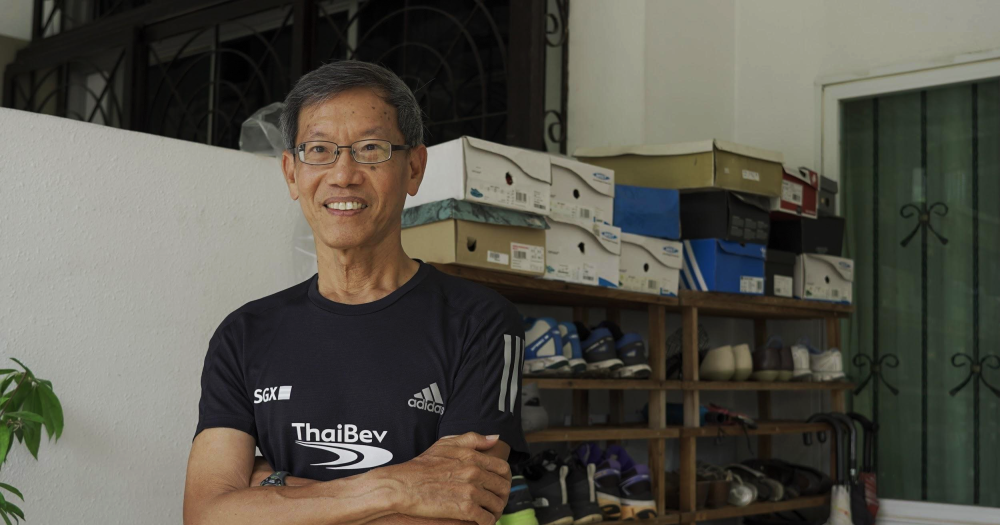10:40pm: I'm fending off mosquitos in my running shorts at the open carpark near Upper Peirce Reservoir.
I'm waiting for Lim Nghee Huat, an ultramarathoner who's participating in the SGX Bull Charge Charity Run, at the organisation's invitation.
While I originally had arrangements to meet Lim at 9pm, his wife Deborah informed me that they would be delayed, as Lim was very tired from the last few days of running and wanted a little more sleep before setting out on that night's session. Deborah tells me not to ask him if he is sleepy.
Our meeting time would be pushed back to 9:30pm, then 10pm, then 10:30pm. For the past 10 days or so, Lim has had to strike a fine balance when it comes to rest time.
Too little sleep, and he's at the risk of getting into an accident from being too sleep-deprived. But more rest means that he has less time on the road.
Lim finally arrives just before 11pm, and without much introduction, we start moving — after all, the clock is ticking.
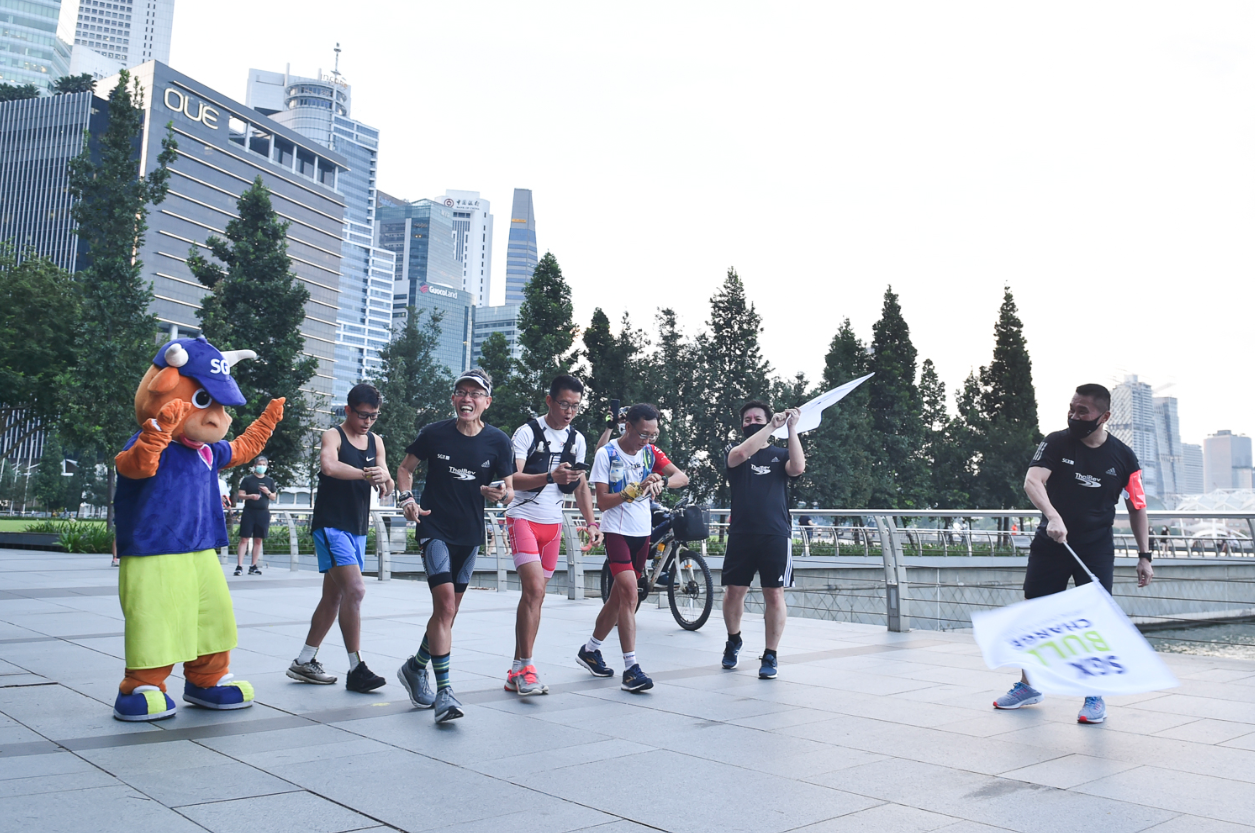 Lim (third from left, in grey cap) at the start of the SGX Bull Charge Charity Run, which was flagged off innocuously on Oct. 30 at the Marina Bay area. Photo via SGX website.
Lim (third from left, in grey cap) at the start of the SGX Bull Charge Charity Run, which was flagged off innocuously on Oct. 30 at the Marina Bay area. Photo via SGX website.
Like many runs this year, runners participated in their own time, tracking their results and uploading them online, to be tabulated in a virtual leaderboard — which Lim, who also goes by the name Stephen, would go on to top.
Looking at Lim's past achievements, this might not seem surprising; after all, he had made headlines in 2015 for running 2,500km over 50 days — 50km each day — as part of the celebrations marking Singapore's 50th year of independence.
And Lim was no stranger to fundraising for virtual charity runs, having completed a similar challenge earlier this year in support of the Autism Resource Centre.
In spite of that, fellow runners had called him "crazy" for making the attempt at his age.
From Lim's point of view, however, there was a "high chance for [him] to achieve" his intended target.
Aiming for 1,000km: 72km each day for 14 days
He had assessed the risk, Lim said, and calculated the distance based on his past runs, before setting out to complete 72km each day for 14 days, which would allow him to clock a total of 1,000km.
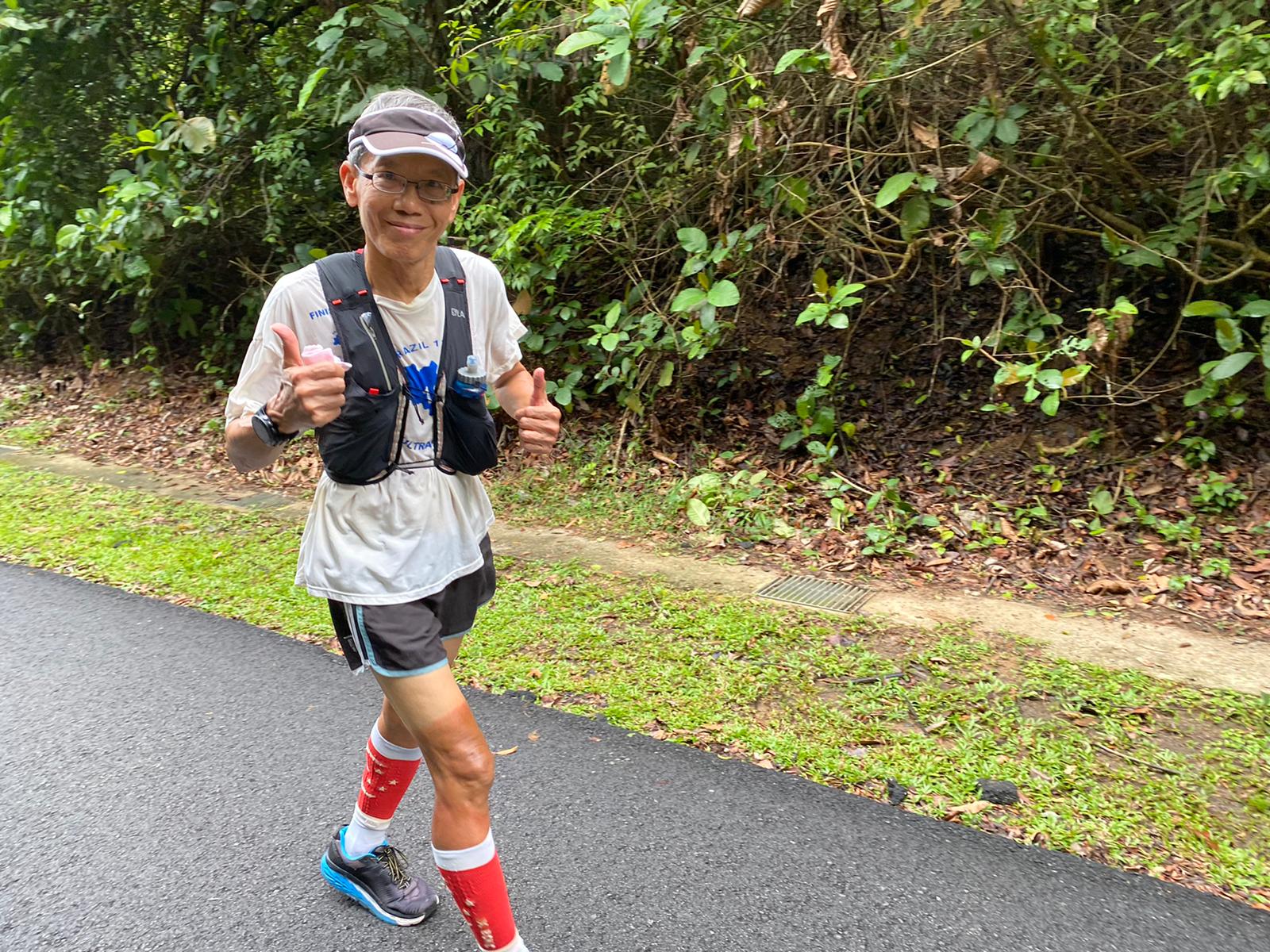
Why 1,000km?
For this year's SGX Bull Charge Charity Run, its 17th edition, SGX committed to donate up to S$1.5 million to local charities AWWA Ltd., Autism Association (Singapore), Fei Yue Community Services, HCSA Community Services and Shared Services for Charities.
Up to S$1 million donated to the charity event would be matched dollar-for-dollar by SGX.
SGX would also donate S$5 for every kilometre ran by a participant, up to the first 100,000.
With this in mind, Lim's wife Deborah decided that a target of 1,000km would be appropriate, as it would correspond with a donation of S$5,000, a nice round number.
"I said 1,000, at least 1,000, if not, no S$5,000 to donate you know?"
"When I said 1,000[km], he looked at me, [as if to say] '1,000?' like fantastic like that," Deborah said, laughing, as her husband gave a wry smile.
A few days after the challenge concluded, Lim and Deborah spoke to Mothership about the experience at their home.
Lim explained that he had taken on the 1,000km challenge only after having done the calculations and concluding that it would be within his physical limits.
"Since I have the ability, I thought that I can. [There] is a high chance for me to achieve lah."
To Lim, his critics simply could not visualise him succeeding at a feat which had not been done before — at least, not in Singapore.
It was simply "beyond their imagination", Lim said, acknowledging that running 1,000km in two weeks would be a "very tough attempt" requiring "courage to try".
Even 800km would be a record for a 14-day ultramarathon run in Singapore's humid climate, Lim said.
"I told myself, [if] I can hit 800km, it will be a great achievement for me lah."
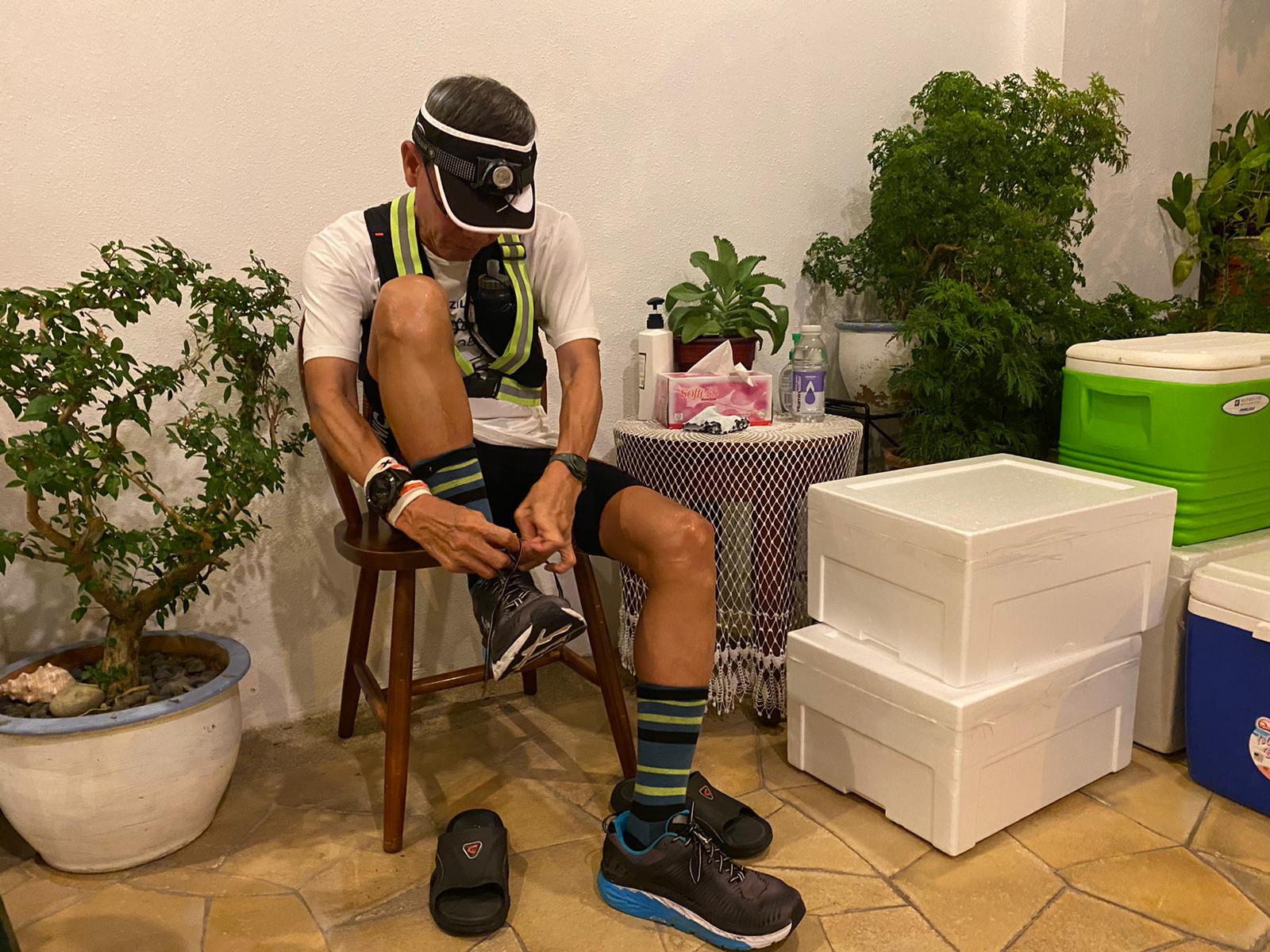 Lim at his home preparing to set off for one of the runs. Photo by Deborah Lim.
Lim at his home preparing to set off for one of the runs. Photo by Deborah Lim.
An unexpected element to the challenge: insufficient rest
For all his calculations, Lim candidly confessed that one thing he did not anticipate was how little time he would have between runs to recover.
Back in 2015, Lim explained, he and his fellow ultramarathoner, Yong Yuen Cheng were able to complete their daily 50km distance relatively quickly, leaving them with adequate time to rest and recover for the next day.
Even a strong runner would need 10 hours to clock 70km in a single run, Lim explained.
For Lim, however, his daily runs ended up taking as long as 17 hours, after an initial strong start.
He averaged 72km for the first two days, clocking 78km and 66km for the first two runs in under 13 hours each.
On day three, Lim decided to start his run a few hours earlier, in hopes of clocking a longer distance earlier into the challenge.
But he soon felt the effects of insufficient rest, after less than four hours.
"I couldn't open my eyes, you know?" said Lim, laughing at the memory.
"I tried to make myself more active, so I moved very fast, but somehow my eyes don't cooperate with my body!"
Lim remembers walking dangerously fast with his eyes closed for a stretch, before deciding that it would be best for him to take a nap.
With a laugh, Deborah recalls how she had to hurriedly empty the van of cooler boxes and refreshments to make space for Lim to sleep.
Refusing to chalk it up to inadequate planning for the attempt, Lim reminds us that there was no one to ask for tips, given that this was something that had not been done before.
But he would soon encounter another obstacle.
Lim recalled how he pushed himself at a faster pace than he was able to sustain.
After power walking for the first 8km one day, Lim felt like he had the capacity to go faster, and began to run at a relatively fast pace.
He kept it up for almost 3km before getting stopped by pain.
He had painful, swollen legs after that, and was only able to walk, adjusting his landings so that he could put less pressure on his shins.
The setback didn't seem to have fazed Lim one bit, who simply adjusted his pace and kept on clocking the kilometres. Lim said:
"The pain, the discomfort is just temporary. If you can tolerate for one day, two days, it will [be] gone. But the result will stay there for the rest of your life ah.
So I just try to do as much as possible."
"When I go to an event, I always give 100 per cent of what I have," Lim said.
"If I still have some energy left after I cross the finishing line, I'm not trying my best."
Pioneering the ultramarathon in Singapore
Lim was a sportsman from young, competing in inter-school competitions and throughout his time in National Service. However, he was more involved in running and triathlons in his younger days.
Triathlon competitions were no mean feat, with Lim completing a full Ironman triathlon in 1989.
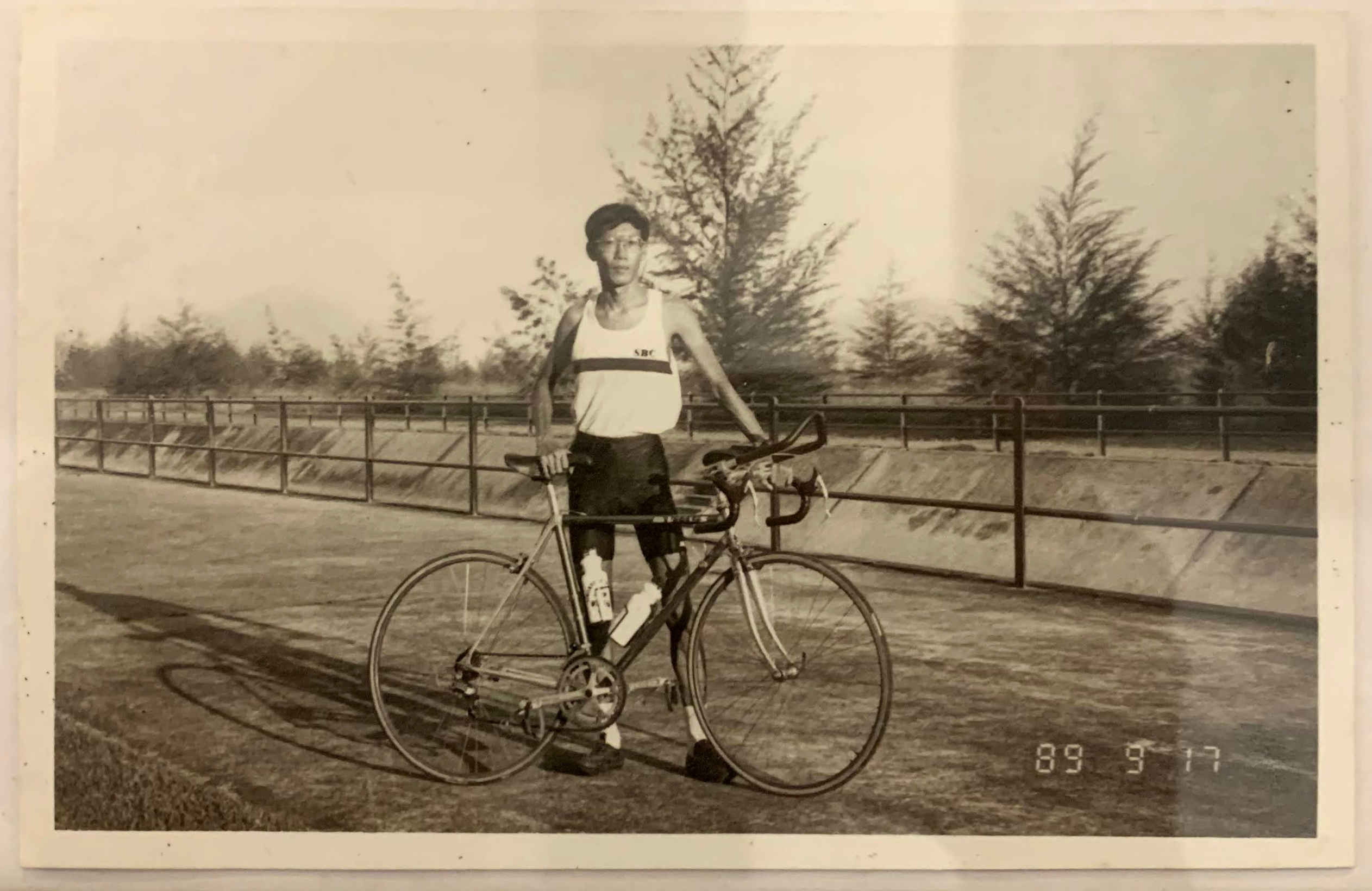 A younger Lim at the 1989 Ironman World Championship in Hawaii, where he completed the requisite 2.4-mile (3.86 km) swim and 112-mile (180.25 km) bicycle ride, topped off with a full marathon (42.20 km) in 11 hours and 58 minutes.
A younger Lim at the 1989 Ironman World Championship in Hawaii, where he completed the requisite 2.4-mile (3.86 km) swim and 112-mile (180.25 km) bicycle ride, topped off with a full marathon (42.20 km) in 11 hours and 58 minutes.
But it wasn't until 2005, when Lim was 52, that he became an ultramarathoner, almost by accident.
Then, Nanyang Technological University (NTU), Lim's alma mater, was approaching its 50th anniversary. Lim and other NTU alumni came up with the idea of a race around Singapore to mark the occasion.
The run, which brought runners all around the island, for a distance of 168km, had a charity element to it as well — bursaries for students in need.
Back in 2005, Lim explained, ultramarathons were relatively niche, globally and in Singapore. But the organisers were nonetheless able to gather a handful of interested participants.
At the end of the event, Lim and a fellow runner, Yong Yuen Cheng, felt that it would be a waste to simply go back to "normal" marathons, after months of training.
This led to him becoming a pioneer of sorts in the local ultramarathon scene.
Running for charity
"Running to me is a gift," said Lim, when asked what it means to him.
"And also, running is a lifestyle for me," he added.
"I think everyone should try — not just running — exercise should be a part of our lifestyle."
And Lim was quick to stress that ultramarathon events such as the SGX Charity Run were "exceptional", and will be followed up by weeks of "totally no running" so that his body can fully recover.
But the list of exceptions is a long one.
Lim showed me his "selected sport achievements" from the past decade or so.
The list includes races in unimaginable weather conditions, such as a 217km race through the "Death Valley" desert in California in 2013, with temperatures exceeding 50°C on some days.
There are no less than 10 races where he completed punishing distances above 200km.
What pushes him to make these fairly-regular exceptions?
Causes.
Just like how Lim stumbled upon ultramarathon racing, using his athletic endeavours to raise funds was also an area where success came unexpectedly.
In 2004, one of the Members of Parliament for Marine Parade GRC, where Lim lived then, suggested that he use an upcoming marathon to raise funds for a community project.
At a fundraising dinner, attendees were asked to pledge to donate amounts of S$50 or S$100 if Lim completed the marathon.
Lim almost seems to still be incredulous as he recalled the result, laughing to himself:
"I just run, and then [we] raised S$15,000 you know. Then I said, 'wah, so easy you know, one run can raise S$15,000?'
I never thought that one day I can just do a marathon and then I can raise S$15,000 for charities."
That first fundraiser led to other charities approaching him for his help at their events as well.
Since then, all of Lim's ultramarathon running has been dedicated to various causes.
"When you do something good, something extraordinary, people will support you," Lim said, sagely.
He estimates that he's raised over S$2 million for various organisations and causes over the years.
Lim, a grassroots leader in his younger days, is proud to count Emeritus Senior Minister Goh Chok Tong as one of his supporters, and recalled how Goh once said to him, "as long as you can run, I will support you."
Lim has no plans to hang up his shoes anytime soon.
"One day, when really I can't run [and] there is not much contribution for my running to charity, probably I have to stop lah.
But since I'm still able to run, why I need to stop?"
Not all smooth sailing
But the journey has not been all smooth sailing.
Deborah, who said that she dislikes exercise, often found herself handling their three children alone while Lim trained.
"Married that time, I also don't know he is like that one. I really didn't know."
Managing such a difference in their lifestyle was "quite hard", Deborah shared.
Thankfully, the couple have "passed a hard time", she said.
"Joyful" experience for Lim and his wife
Deborah had initially expected to take a hands-off approach to supporting her husband.
But she was soon scolded "properly" by their son for proposing the 1,000km distance but not being involved in making it happen.
Deborah ended up being a significant part of the support team that rallied around Lim to help him achieve the extraordinary feat.
Like Lim, she had not anticipated the full extent of how challenging the attempt would be, even for her.
"It's quite tough for me," she said, because when Lim settled down to rest after each run, she would still have to prepare for the next day. "So I sleep even lesser than him."
But she kept her spirits up, finding her motivation in their shared goal to reach the end point of the challenge.
"I still very energetic every time, and joyful," she said.
Deborah summed it up as such:
"I am a person who disliked exercise, but I married him.
So now my journey with him is, we have to get used to each other."
For most of our interview with Lim, Deborah sat a short distance away from where we were recording, and took pictures to document the process.
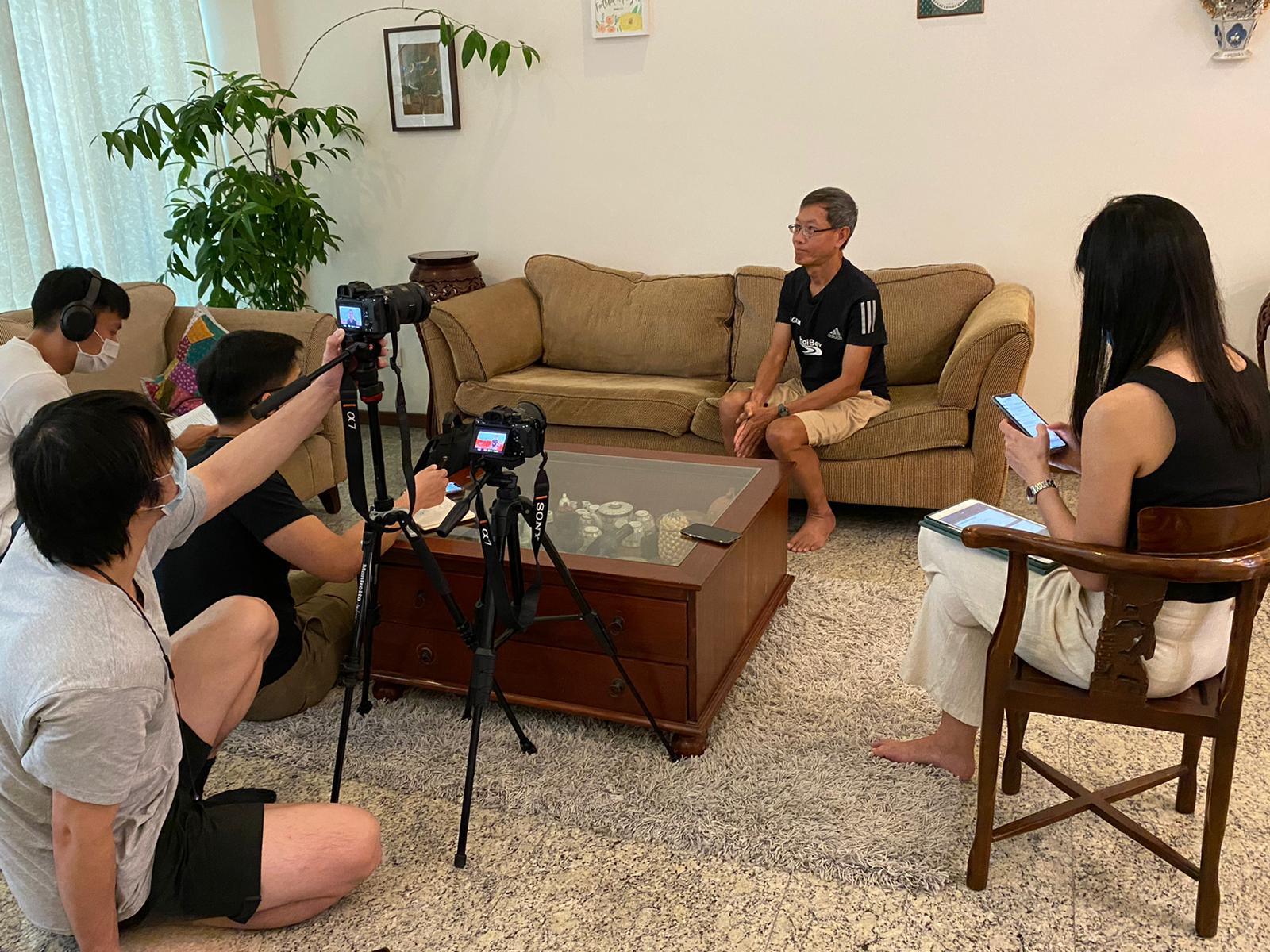 "Working photos for nice memory", said Deborah over WhatsApp, sharing photos she took of our interview with Lim. Photo by Deborah Lim.
"Working photos for nice memory", said Deborah over WhatsApp, sharing photos she took of our interview with Lim. Photo by Deborah Lim.
New friends and supporters
Providing backup for Deborah were the many friends and supporters who came alongside to support Lim in his attempt.
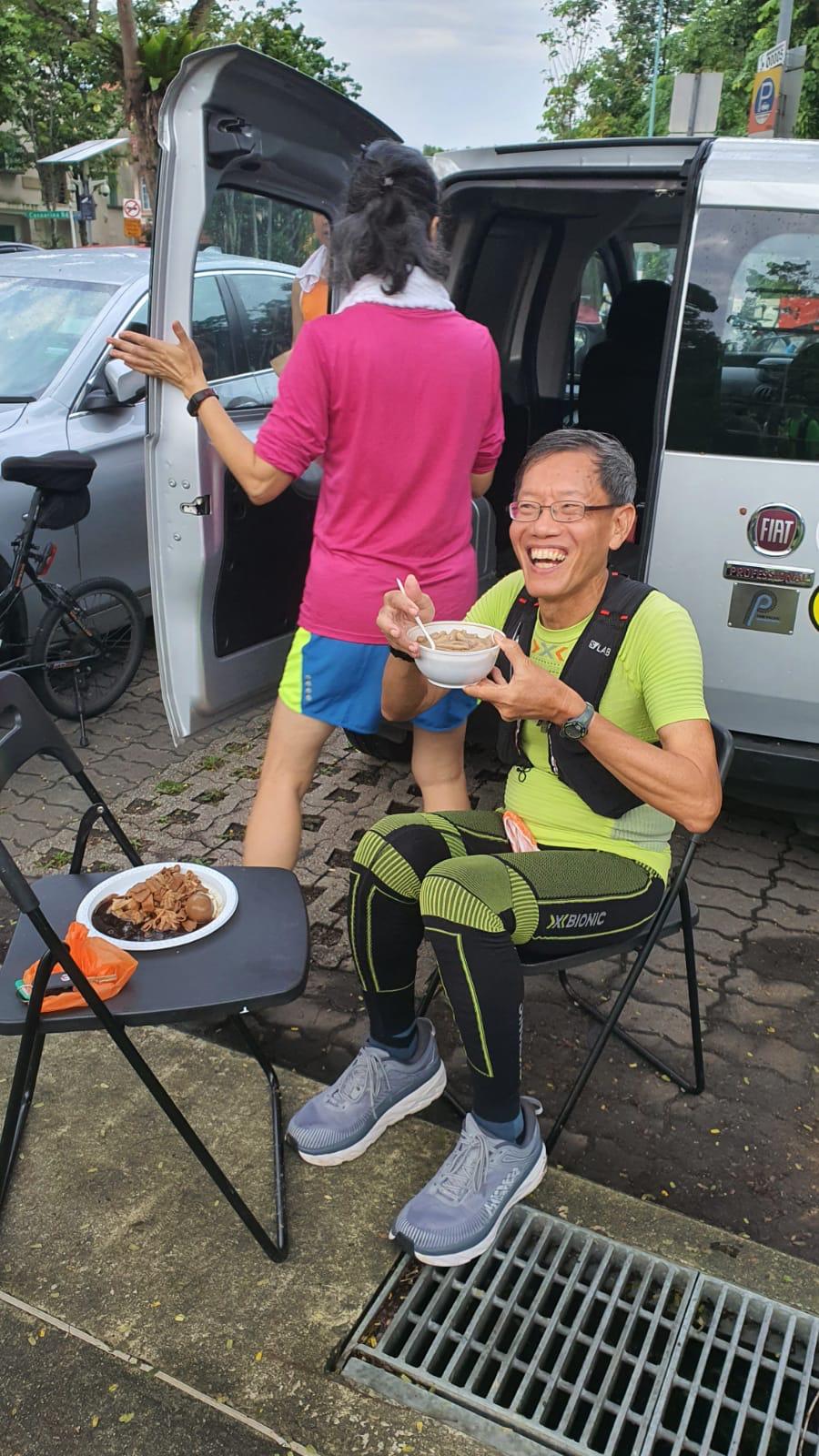 Lim having a meal of Kway Chap during a break on one of his runs. Photo via Deborah Lim.
Lim having a meal of Kway Chap during a break on one of his runs. Photo via Deborah Lim.
One of Lim's neighbours, 75-year-old Allan Lee, agreed to cycle alongside for segments of the run to help Lim keep up his pace.
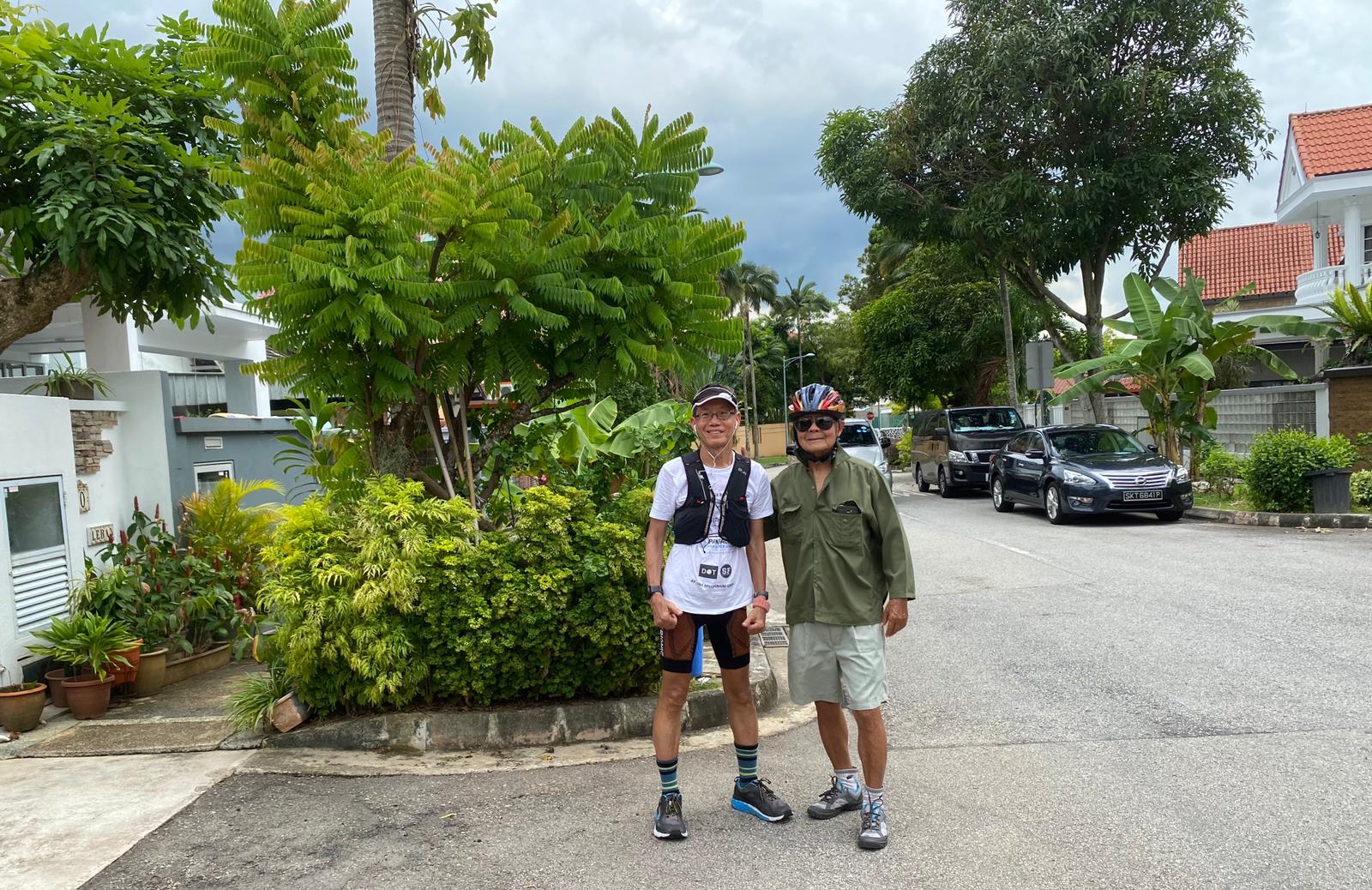 Lim and Lee. Photo by Deborah Lim.
Lim and Lee. Photo by Deborah Lim.
Ling Yap, who had not met Lim prior to the charity run, accompanied him on three of his 11 runs, and was there at the finish line when Lim hit 800km.
"It was quite a boost [in] morale, for me to carry on," Lim said.
 Lim and Yap. Photo via Deborah Lim.
Lim and Yap. Photo via Deborah Lim.
But there were also long stretches which he walked without company.
On these lonely stretches, Deborah joined in to walk with Lim — partly because it would be dangerous for him to be "sleepwalking" on the trail in the dead of night.
"We just go, two of us, and we just do it. Even though [you can only] walk, I will walk with you," she said, recalling how she encouraged Lim to push on.
Reaching 800km
On the night where I first met Lim, we walked just over 6km together, making easy small talk, with Lim asking me about the sports I did, where I got my shoes from, and more.
We parted ways just after midnight, when a pair of Lim's friends arrived to walk with him.
These were schoolteachers, Lim said, who were intending to walk with him through the night before taking a quick nap and heading to school early the next morning.
As it turns out, that same day, Lim pushed on through an additional 20km, on top of his intended 50km distance, bringing the total count to exactly 800km.
Lim crossed the 800km mark with two pacers by his side in the late afternoon on Nov. 12, somewhere in Upper Peirce Reservoir park.
Lim, delirious from the exertion, waved his arms victoriously while calling out "huat ah!" (a Hokkien saying indicating good fortune) as he proudly showed off the numbers on his running watch as evidence that he had made it to 70km.
"Like drunken prawns," Deborah remarked with a laugh.
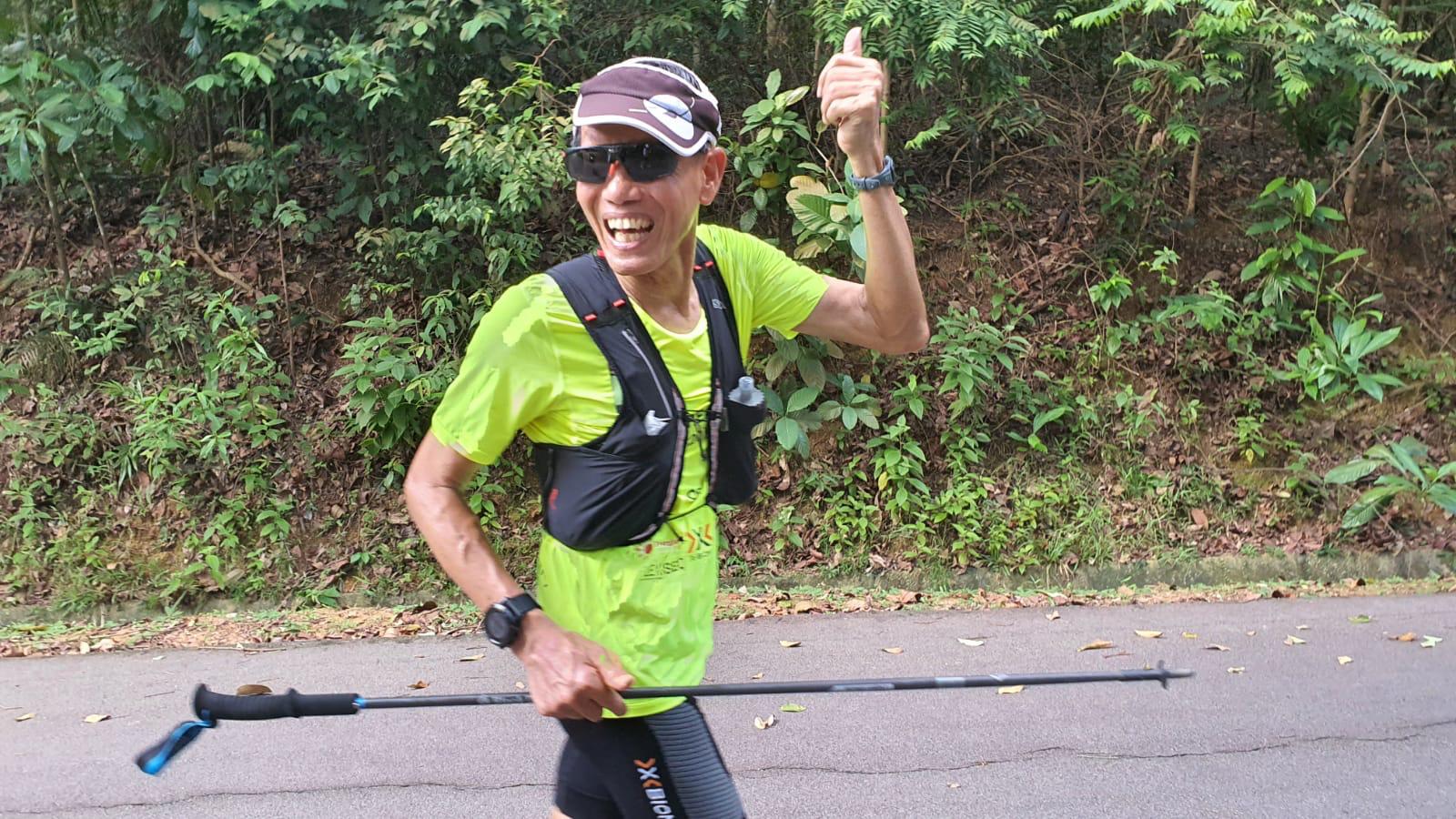 For the final run, Lim clocked 70km in just under 17 hours, his longest session in the whole two-week period. Photo via Deborah Lim.
For the final run, Lim clocked 70km in just under 17 hours, his longest session in the whole two-week period. Photo via Deborah Lim.
Seeing the look of pure joy on Lim's face as he completed his ultramarathon endeavour reminded me of he said during our chat about his ultramarathon endeavour:
"If you don't try, you won't know."
Now, 800km later, he knows.
Stories of Us is a series about ordinary people in Singapore and the unique ways they’re living their lives. Be it breaking away from conventions, pursuing an atypical passion, or the struggles they are facing, these stories remind us both of our individual uniqueness and our collective humanity.
Top image by Abriel Tay
If you like what you read, follow us on Facebook, Instagram, Twitter and Telegram to get the latest updates.
